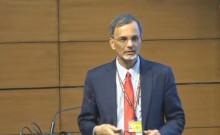
China's economy appears to be slowing further as a private survey on Tuesday showed that manufacturing output contracted again in March, increasing the risks for the government to achieve its growth target of 7 percent this year.
The flash HSBC/Markit Purchasing Managers' Index (PMI) decreased to 49.2 in March, down 1.4 percent from February's level of 50.7. The flash PMI now stands at its weakest reading since April 2014.
"The weak overall PMI suggests that the improvement in February was just a temporary 'blip', possibly related to the timing of the Chinese New Year holiday being unusually late in February. It also brings the HSBC/Markit manufacturing PMI more in line with the very weak industrial production data for January and February, albeit a substantial gap remains," said Danske Bank in a note on Tuesday.
The details of the PMI data show that manufacturers in the country continue to struggle with subdued domestic demand and falling consumer prices. The new order sub-index dropped to an 11-month low of 49.3 in March, while new exports orders recorded a second consecutive monthly decline.
"This is the latest in a string of disappointing data and strengthens our view that the economy probably slowed sharply in Q1. Indeed, our China Activity Proxy suggests that GDP growth fell below 7.0% y/y this quarter," said Capital Economics in a note.
Most worrying part of the data is an increase in unemployment rate for the 17th consecutive month, reaching its weakest level since March 2009.
"The poor PMI, in line with recent sluggish hard data, also confirms that the start to 2015 has been very weak. The data so far suggests that GDP growth could decline below 7.0% y/y in Q1 from 7.3% y/y in Q4 last year. Hence, the government's 7% target for GDP growth in 2015 already appears difficult. We will have to cut our 7.2% growth forecast for 2015," said Danske Bank.
The People's Bank of China (PBoC) had already cut interest rates twice since November and the latest PMI data puts further pressure on the central bank to ease monetary policy.
"The survey results will place greater pressure on the government to ease policy further," said RBC Capital Markets in a note.
The Asian Development Bank (ADB) expects the growth in world's second largest economy to decelerate to 7.2 percent in 2015-2016 and 7 percent in 2016-17.

















